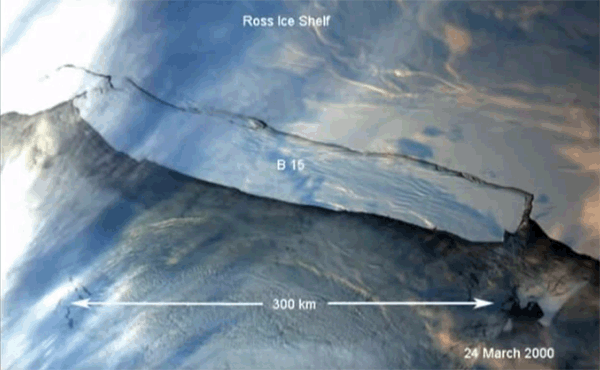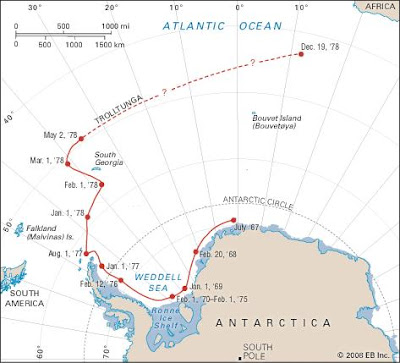Not a hope you might answer. I have not been preselected by a bunch of political backroomers and elected by bearded wastrels in universities. If I had been, there would be no problem. The bank might even bag it for me. Brown paper bag.
Of course, I could explain that I wanted to launder much of it through a casino - and there is one not far from my bank branch. My bank (which one again) is adept at facilitating laundering. They are so good at it that they have even made the evening news ! That might count in my favour when the 'fees' are taken into consideration.
CBA money laundering scandal: how it happened
I shall let you follow the money on that one. Hot money needs cooling down.
But the clincher would be the global warming scam. I just might swing it. Even better were I an elected member of the Oz Gummunt.
The liklihood of actually getting some bearded wastrels to Antarctica is slight though, as all too often they are turned back by great chunks of ice.
As happened last month.
A dirt great chunk of ice scared the living daylights out of Uni-warmints across the globe.
We'rrrrrre all Dooooomed.
Jo dropped by to help us appreciate the humour.
There have been far bigger Antarctic icebergs
than the latest A68 Larson C berg
CNN is “freaking out” about the latest large iceberg. But John Sutter doesn’t mention that there was an iceberg twice its size in the year 2000 which was 11,000km2, and that as long ago as 1967, two other icebergs of a similar size were recorded. Thanks to John McLean for the links.
(And) Tony Heller has found a newspaper story about an even bigger one from 1956. This monster iceberg was allegedly 334km x 96km or 32,000 km2. (h.t John of Cloverdale).
Monster bergs are everywhere.
Lazzara lists two other massive icebergs as well as B15 that occurred in just 18 months: A38 in Oct 1998 was 7,600km2 and A43 in May 2000 was almost as big as B15, being 9,250km2. h/t WS All three of these were larger than the current “freak”.
When it comes to long term trends in iceberg sizes, the only scientific answer is “who knows”. Satellite records are so short, if a bigger iceberg broke off in say, 1811, how the heck would we find out? Not much is left of an iceberg 100 years later. What kind of proxy could show it ever existed — ancient stone carvings of satellite pics from ancient Greece?
The latest 2017 Larson C iceberg is 5,800 square kilometers and weighs a “trillion tons”. But back in 1967, two icebergs calved – one of 7,000km2 and one of about 5,000 km2: Swithinbank (1969), basing on analysis of the ESSA-3 satellite imageries, reports that in 1967—68 two giant icebergs were seen in the eastern part of the Weddell Sea, measuring 70 by 100 km, and 45 by 100 km respectively, with total area of about 11.000 km.– Birkenmajer, 1980
Apparently the smaller of these two was called “Trolltunga” and floated around til 1978. Sadly, the real Trolltunga was pre-youtube, no photos I can find, except of the region in question.
But an even larger iceberg apparently was B15 — nearly 11,000 square kilometers in the year 2000:
Wesche: B15 …. This giant iceberg—the largest observed from satellite (dimensions of 295 km × 37 km [28])—calved from the Ross Ice Shelf in March 2000.
If I read this correctly, we are talking about ice that takes a century or even 2,000 years to go from the “grounding line” to the front. The Grounding line is the last point that the ice sheet touches land. The part beyond that is hanging out over the ocean:
We were mainly interested in the differences of residence times dependent on the density of surface patterns on the 15 km strip along the ice front. In case of very dense patterns we found that the ice needs between 78 and 968 years to move from the grounding line to the ice front. For less dense patterns we obtained a range between 140 and 2,764 years. — Wesche 2013
In Table 3 of Wesche, there are ten potential calving fronts greater than 200km wide spread over four sectors of Antarctica. It’s just a matter of time before another big berg breaks off.
This is the Trolltunga region. The little iceberg on the left is not “Trolltunga 1967″ which was around 45km x 100km.
For the curious, Encycploedia Britannica has this map and path of Trolltunga, (see above a bit) which bounced around near the Antarctic coast for years before heading into the Atlantic Ocean, where it still took a year to melt. Strangely Encyclopedia Britannica has no article any more.
Of course 'we' have to send ship-loads of 'scientists' to take a look, joining the other scientists already there with their vehicles and architecturally spiffing buildings, and heaters and engines and planes and helicopters. All heating the place up.And in other unrelated but curious news, apparently Winston Churchill was considering using an iceberg as an aircraft carrier in WWII.
But the ships get stuck in the ice, don't they.
Duh !!
"But... yes, but..... no but...", they say, "the ice melts and the sea levels will rise. We need to measure it"
Hmmmm. The latest measurements show the sea levels falling.
NASA Confirms Falling Sea Levels For Two Years Amidst Media Blackout
Back to the drawing board fellows. Better get another 'grant' of money borrowed from a profligate and in-debt GummuntHave a drink. I can pop an ice cube in for you.
There's plenty to go around.
Pax





Stop Press! Iceberg breaks off the pack in summer. Oh noes.
ReplyDeleteQuick, send money.
Delete